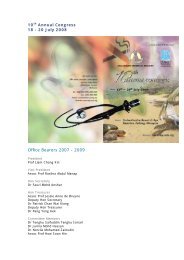download - Malaysian Thoracic Society
download - Malaysian Thoracic Society
download - Malaysian Thoracic Society
Create successful ePaper yourself
Turn your PDF publications into a flip-book with our unique Google optimized e-Paper software.
Annual Congress of <strong>Malaysian</strong> <strong>Thoracic</strong> <strong>Society</strong><br />
antibody directed against IgE have been tried in treating ABPA .However, none of these medications have been<br />
shown to be of benefit in large, randomized, double-blind, placebo-controlled trials. Systemic corticosteroid<br />
is the mainstay of treatment for ABPA, based on case series and expert opinion for its benefit to induce<br />
remission, reduced frequency of acute exacerbations, preservation of pulmonary function, improved quality<br />
of life and prevent progression of disease .However, the long-term adverse effects of corticosteroid therapy<br />
may result in profound immunosuppression and debilitating metabolic abnormalities. Eradicating Aspergillus<br />
species using itraconazole to diminish the antigenic stimulus of bronchial inflammation has been shown to be<br />
beneficial in ABPA as steroid sparing agent. Voriconazole, a newer antifungal azole with greater bioavailability,<br />
has the potential to be more effective. Omalizumab, monoclonal anti IgE antibody, may be of benefit in certain<br />
patients.<br />
Referrences<br />
1. Agarwal R. Chest 2009;135: 805–826.<br />
2. Vlahakis NE. Mayo Clin Proc 2001;76:930–938.<br />
3. Greenberger PA. J Allergy Clin Immunol 2002; 110:685–92.<br />
4. Stevens DA. N Engl J Med 2000; 342:756–62.<br />
Lunch Satellite Lecture<br />
(Bayer Healthcare)<br />
Key clinical milestones of Moxifloxacin In<br />
treating respiratory tract infections<br />
Richard Loh Li-Cher<br />
Malaysia<br />
Respiratory quinolone represents an exciting class of new antibiotic available to us for use in the treatment of<br />
respiratory tract infections (RTI). This applies to bacterial sinusitis, acute exacerbation of chronic bronchitis/<br />
COPD and community-acquired pneumonias. Moxifloxacin, discovered in 1994, extended the spectrum and<br />
potency of earlier fluoroquinolones, such as ciprofloxacin and levofloxacin and has been licensed for use for<br />
RTI in Europe and the USA since 1999. To date, its efficacy and safety has been tested in over 17,900 patients<br />
in clinical trials setting, and in over 134,000 patients in non-interventional post-marketing surveillance studies.<br />
The data supports its efficacy or non-inferiority over other comparators while retaining benefits of being a<br />
shorter course, a faster resolution of symptoms, ease or early IV/oral switching, prolonging the time to next<br />
exacerbation of bronchitis, and possibly lower rates of developing resistance. The over 10 years of robust<br />
experience of moxifloxacin has testified to its safety, in contrast to other new quinolones like gatifloxacin,<br />
gemifloxacin, sparfloxacin, that had fallen by the wayside because of unacceptable toxicities. Moxifloxacin,<br />
however, has reduced anti-microbial activity against pseudomonas compared to older quinolones like<br />
ciprofloxacin, and has anti-tuberculosis property with implication of its use in our local setting where pulmonary<br />
tuberculosis remain somewhat endemic. This lecture describes the key clinical trials of the various RTI with<br />
moxifloxacin and discusses its obvious influence in our clinical practice and treatment guidelines today.<br />
44








